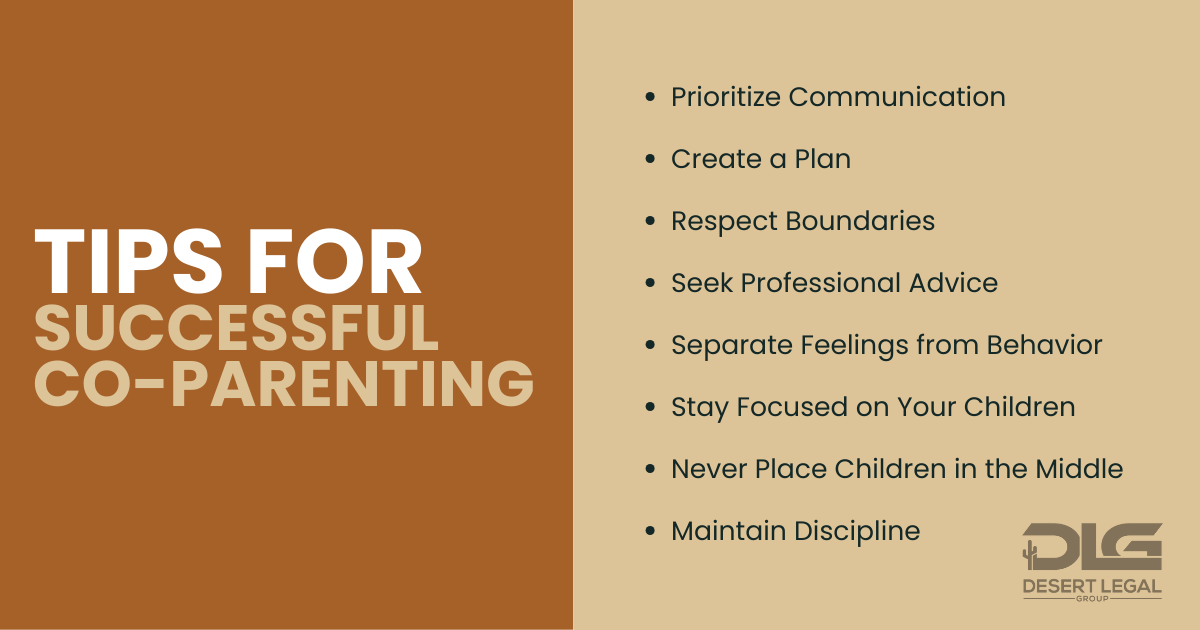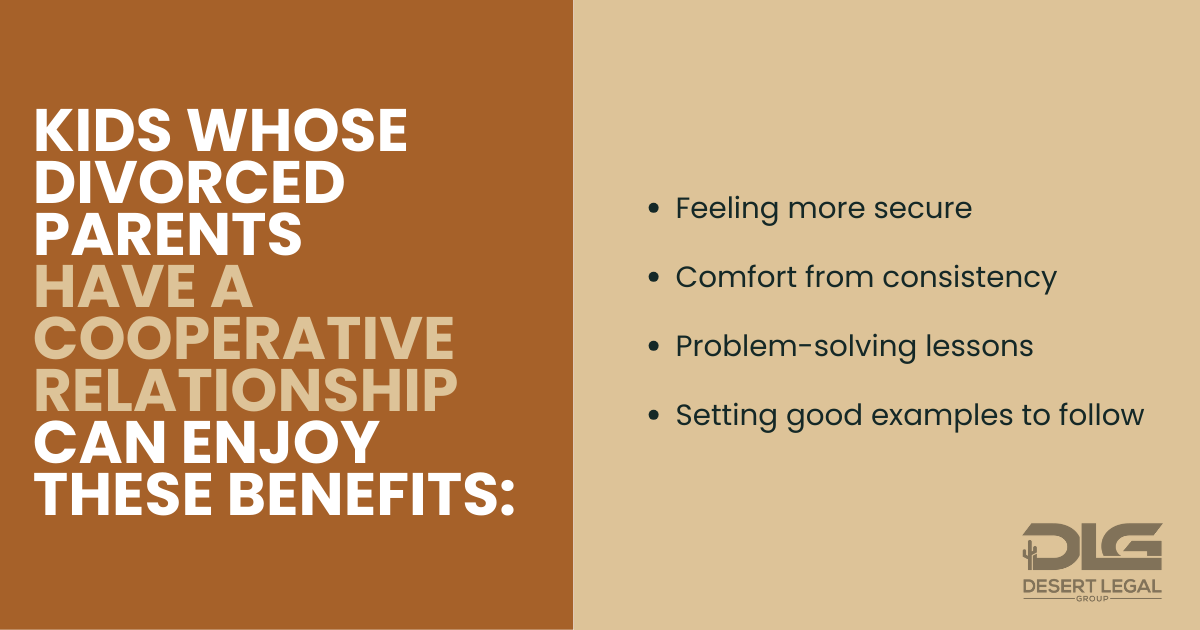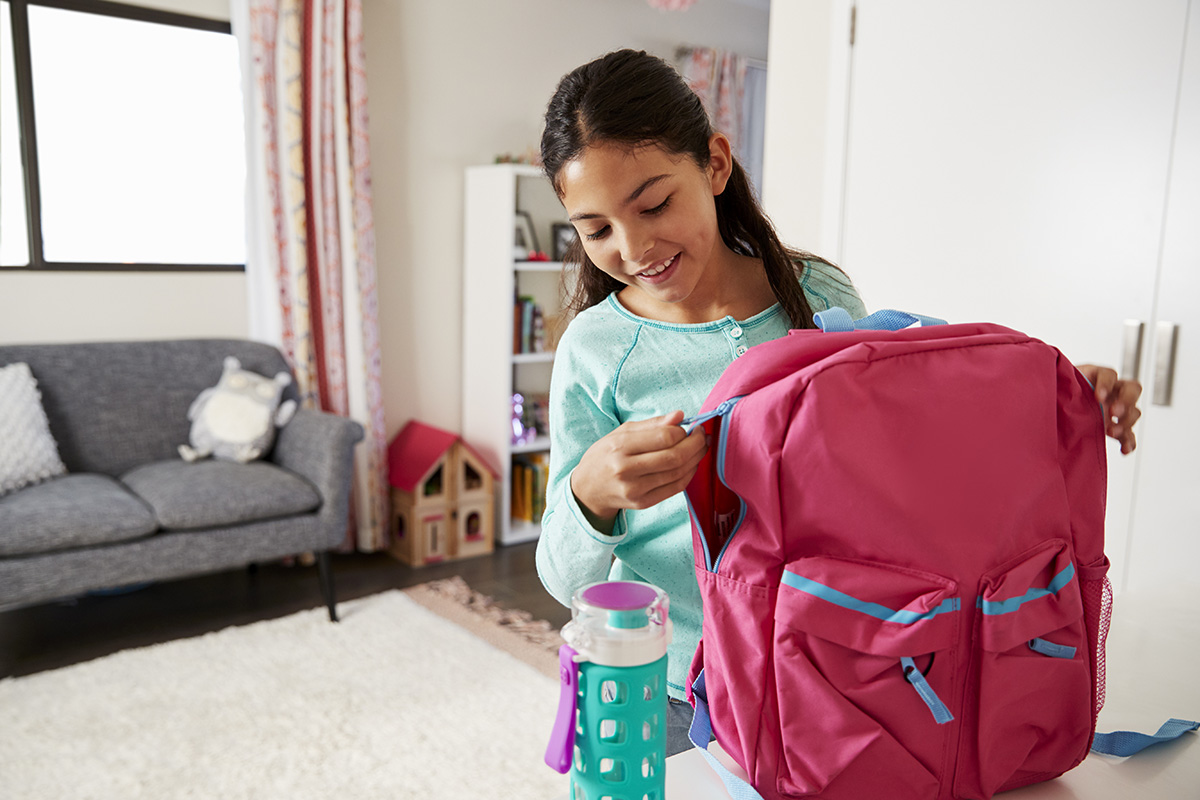If divorce has become an inevitability, you are likely thinking about how you will co-parent with your soon-to-be ex. As part of the eventual divorce decree, there will be a court-ordered shared parenting arrangement that you and your future ex must abide by. Parenting agreements ensure that both parties follow the rules, but that doesn’t mean working together will be easy.
While no words can make the transition through the divorce process easy or predictable, following basic co-parenting tips can help your children as they transition to their new living arrangements. Along the way, the attorneys at Desert Legal Group will be here to provide advice for planning for parenting time and other issues that may arise.
Tips for Successful Co-Parenting
Co-parenting refers to the practice where parents coordinate child-rearing decisions and share responsibilities when it comes to raising children. Communicating and collaborating are at the core of successful co-parenting.
Studies have shown that healthy co-parenting lowers the risk that your child will internalize negative feelings associated with a divorce. Co-parenting also reduces the risk that your child will externalize behavioral problems. By following these co-parenting tips and prioritizing the needs of your children during divorce, you can use the proven benefits of co-parenting to raise your children and address their emotional and developmental needs as life after divorce ensues.
Prioritize Communication
Successful co-parenting will not be possible unless there is an open line of communication between both parents. Going through a divorce can be very emotional. It can be difficult to keep personal feelings out of your communications, but you should try to remain civil and focused on your children. Open dialogue keeps important communication channels open so you and the other parents can make informed decisions about your child’s well-being.
Any form of communication may be suitable, depending on your preferences, such as emails, texts, instant messages, or communications sent via special co-parenting apps. The trail of
communications can also help you in family court by demonstrating that you consistently made good faith efforts to co-parent and work collaboratively with the other parent during the divorce.
Create a Plan
After your divorce and possibly during the divorce process, you will need to agree to a shared parenting arrangement. This agreement will be formalized in the divorce decree, but you can draft one with the help of your spouse and your respective attorneys during the divorce process. Creating a co-parenting plan is a great first step that can demonstrate to you both that working together in the interest of your children will lead to positive outcomes for everyone.
Topics of the agreement could include guidelines for who is expected to handle which responsibilities. You can also lay out the expectation that a parent is required to contact the other in the event of an emergency involving the children. Agreements regarding who sees which children during holidays are also important. These written terms can avoid conflict later on and provide a level of predictability that will ultimately benefit your children.
Even when an agreement is in place, both parents should be open to the possibility of making reasonable adjustments and accommodations in the event of unforeseen circumstances.
Respect Boundaries
Respecting boundaries is crucial in co-parenting. Remember, you are in the process of legally changing the relationship you have with your spouse. Topics that were appropriate during your active marriage may no longer be appropriate.
Avoid discussing personal matters unrelated to your children’s welfare, such as past relationships, or making negative remarks about each other. Ensure all interactions remain respectful and professional.
Seek Professional Advice
You do not have to handle every aspect of co-parenting on your own. Speaking to friends, relatives, and child development professionals can allow you to benefit from their past experiences and professional training. Professionals can also help you become a better co-parent. There may be times when you and your spouse can benefit from separate or joint sessions aimed at improving communication skills that will allow for more effective co-parenting.
Separate Feelings from Behavior
Personal feelings should play little, if any, role in how you co-parent. Try to remain objective when communicating with the other parent. It’s OK to harbor personal feelings of anger and resentment against your spouse during the divorce process. That is a natural experience during divorce. Do your best to separate those feelings from your efforts at co-parenting.
You can find healthy ways to release pent-up emotions and frustrations. Never communicate negative emotions you feel toward your spouse to your children. Talk to anyone, such as friends, therapists, or even your pet. Getting negative feelings off your chest can help you become a better co-parent. Exercise is another healthy outlet for venting emotions during the divorce process.
Stay Focused on Your Children
When the divorce process becomes particularly emotional, it’s essential to keep your focus on your kids. While your identity as a husband or wife may be changing, your role as a parent remains constant, and your children still need you. In moments of sadness or despair, look at a photograph of your kids to remind yourself of what truly matters and find hope for the future. This perspective can help you stay grounded and committed to providing the support and love your children need during this challenging time.
Never Place Children in the Middle
During a divorce, your emotions may seem overwhelming at times. It can be easy to lose your cool in front of the children and talk disparagingly about your soon-to-be ex. Children are very sensitive to those outbursts, and it could ultimately harm them more than anyone else. Keep any issues you have with the other parent out of your kids’ earshot.
Maintain Discipline
While it is important to control your emotions in front of your children, it is also important to maintain discipline and order in your home. The same rules that apply before the divorce starts should continue. Ideally,
While it is important to control your emotions in front of your children, it is also important to maintain discipline and order in your home. The same rules that apply before the divorce starts should continue. Ideally, the other parent should mirror those rules and potential consequences.
Children benefit from consistency and uniformity in their home environments. If one parent is less disciplined, that could incline the child to push the limits of what they can get away with when they are with the less disciplined parent. Ultimately, this could undercut the other parent and lead to resentment.
Benefits of Co-Parenting for Your Children
The benefits of co-parenting are clear. Co-parenting shows your children that they are still the center of your and your ex’s lives. The tips in this article will help your children grow, both emotionally and intellectually, under the guidance of two loving parents.
Through your co-parenting partnership, children will recognize that they are more important than the conflict that ended your marriage. Despite the changing circumstances, your love and commitment to them remain steadfast.
Kids whose divorced parents have a cooperative relationship can enjoy these benefits:
- Feeling more secure. Children who see their parents working together can feel more safe and secure because they enjoy the love and affection of both parents. Children are better able to adjust to the changes that come during divorce when they see that their relationship with both parents has not changed.
- Comfort from consistency. Co-parenting preserves many of the aspects of child-rearing that happen in families where both parents are married. Even though the parents now live apart, children can benefit from stability, knowing that discipline and rewards will be uniformly administered at either home so they can understand what is expected of them.
- Problem-solving lessons. Children who see their parents working together during a difficult transition period will learn that peacefully resolving problems has benefits. They may mirror those approaches later in life, both in school environments and as adults.
- Setting good examples to follow. Co-parenting sets a positive example that your children can follow, helping them build and maintain stronger relationships in the future.
Child Custody FAQs
If you are contemplating filing for divorce or recently found out that your spouse filed for divorce, you likely have questions and concerns about how you will co-parent. The attorneys at Desert Legal Group, PLLC, are here to answer your questions.
Schedule Your Divorce Consultation Today
If you are preparing to go through a divorce, it is essential to begin considering how you will co-parent during the divorce and after. Given time, many ex-partners learn to co-parent successfully. While those efforts are not always easy or perfect, it is ultimately your children who benefit when you and your former spouse work together.
The attorneys at Desert Legal Group understand how emotional the idea of co-parenting can be as you begin the divorce process, but we have guided many clients through this challenging time. As your legal counsel, we will provide advice and tips on a wide range of areas, including how you can work with your soon-to-be ex-spouse when co-parenting. To schedule your divorce consultation, contact our office today.
*Editor’s Note: This article was originally published
Sources:
Cabrera, N. J., Scott, M. A., Fagan, J., White, L. K., & Roggman, L. A. (2023). Coparenting patterns and child social-emotional development in low-income families with young children. Child Development, 94(1), 109-127. https://doi.org/10.1111/cdev.13904

Attorney Cory Keith is an exceptional legal professional dedicated to providing effective representation for his clients. Driven by the belief in treating others how he would want himself represented, Mr. Keith has earned a name for himself for his unflagging advocacy and compassionate approach to law.
Mr. Keith attended Arizona State University, earning his Bachelor’s in Criminal Justice and Criminology through a full academic scholarship. With outstanding performance, he received another full ride academic scholarship to attend law school, where he demonstrated exceptional leadership abilities by accepting executive roles in various organizations as well as serving as legal clerk at multiple well-respected law firms.





